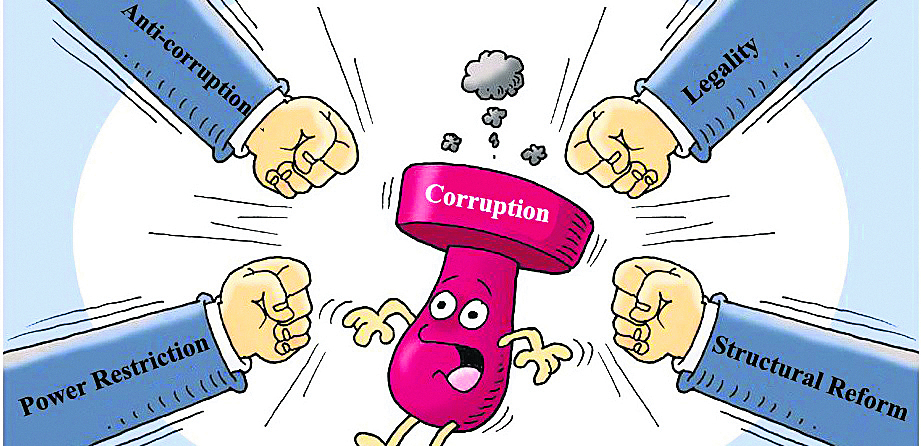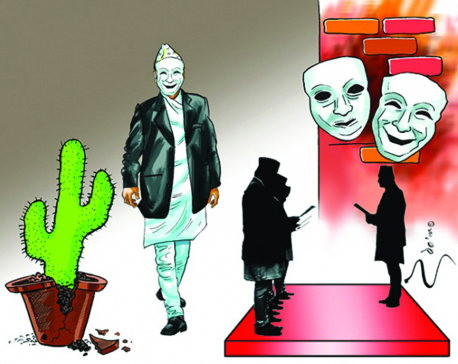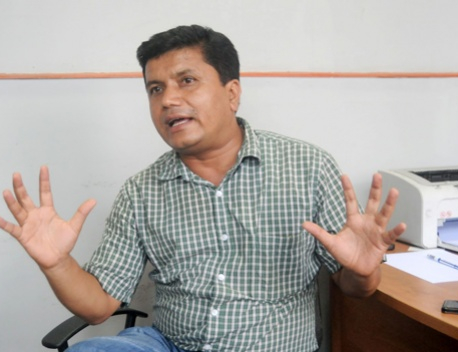
OR

More from Author
Faulty election system of First Past the Post is one of the main reasons responsible for motivating political corruption
Corruption is a social disease prevalent in almost all countries—developed or developing—of the world. But it is rampant in developing countries than in developed ones. Political instability, faulty election system, social and cultural contexts are some of the reasons that have created fertile ground for increasing corruption in developing countries.
Corruption is a widespread phenomenon which undermines good governance. It damages democratic institutions, erodes rule of law, and hampers economic development. Corruption becomes instrumental in breeding other forms of serious crimes such as transnational organized crime, human trafficking and money laundering.
Good governance requires a transparent, accountable, and clean government dedicated to the needs and aspirations of people. Good governance practices may vary according to particular needs and circumstances of different societies. Hence, governments should ensure that the service delivery is done in a transparent and accountable manner. Actually, corrupt practices of a bureaucratic hierarchy are some of the overarching obstacles in the promotion of effective service delivery. Corrupt practices and good governance have inverse relationship: If one increases, other decreases.
Corruption is normally understood as the use of public office for making private gains. There may not always be the motive of instant monetary benefit, but there are situations where the public officials, behind the curtain, engage in policy corruption which indirectly contributes to the illicit monetary gain.
Corruption has several consequences, each of which has either direct or indirect impact on the governance in the developing countries, draining their national resources. There are situations where the country’s scarce resources are not properly used in the required areas or even if used there are chances of embezzlement of resources. One of the striking examples is the construction industry where there is leakage in various stages—right from project formulation, tendering process and construction supervision stages. There is always a lack of transparency which eventually gets landed up in substandard quality. Developing countries are not able to meet their development costs simply by mobilizing their internal resources. They have to depend heavily on the assistance of donors. But corrupt activities create an environment where the donors are reluctant to step in.
The faulty election system of First Past the Post is one of the main reasons responsible for motivating political corruption. Under such system, the political leaders have to spend huge amount of financial resources in the election. Their election budget is contributed by their own money collected through the disposal of their property or donations from different persons or agencies.
After the election, the leaders are morally compelled to satisfy the aspirations of their donors through the illicit use of public office. Moreover, their desire to get electoral spending compensated is always a worrying concern for this leads them to indulge in corrupt activities. The system of financing election costs of the political parties by the government treasury might be a good resort to create fair and free election which might be a departure for the process to good governance. This will be an important step in controlling the political corruption.
The social context in developing countries has given rise to the tendency to become affluent overnight. The societal values and prestige of a person are tied up with affluence. The society does not question how a particular person amassed wealth overnight. Such values are making the society blind to the process of illicit amassing of wealth.
Due to lack of good governance, the sensible and lawful exercise of administrative authority is always undermined by corruption. Socio-economic, political and legal factors are responsible for intensifying corruption. Parochialism, kinship coupled with tendency to get richer by any means is virtually a socio economic condition prevalent in developing countries. The nontransparent party funding and intervention in the policy making process has always remained a big issue. Lack of stringent legal mechanism is obstacle in the persecution of corruption cases.
There are not particular causes for increasing corruption nor any single means to eliminate corruption. Due to its pervasive nature, corruption cannot be eliminated overnight. The strategy needs to be developed keeping in the mind that corruption cannot be uprooted, but can be reduced.
Corruption can be controlled with strong constitutional and legal instruments. The legal base needs to be transparent, fairly simple and result-oriented. It will not be exaggeration to say that stringent laws which allow for access for some activities like automatic access to bank accounts, land registration transaction data, purchase of precious valuables for law enforcement agencies might be key measures which can make the difference in the process of reducing corruption. It is also equally necessary to develop strong code of conduct for politicians, civil servants and businesspersons. Civil society and media have equally important role to play. We need to create the environment in which people can come forward against the corrupt behavior in the society. Likewise, anticorruption institutions need to be equipped with efficient personnel.
Corruption transcends national boundary. Transnational corruption requires cooperation and coordination among countries. Measures related to extradition, mutual legal assistance and asset recovery mechanism need to be developed.
As corruption has several dimensions—political, social, economic, cultural and legal— anticorruption and good governance strategy should be crafted with the support of all segments of the society. This will be instrumental in curbing impacts of corruption.
You May Like This

Cudgelling corruption
During the multiparty democratic dispensation, corruption got democratized. In federal democratic republic Nepal, corruption seems to have become institutionalized... Read More...

Defamation case a planned attempt to discourage media from exposing corruption: FNJ
KATHMANDU, Sept 3: The Federation of Nepali Journalists (FNJ) has denounced the defamation case filed against Nagarik Daily by Nepal Oil... Read More...

Impeachment of Karki is a must for corruption free Nepal: Lawmaker Adhikari (with video)
KATHMANDU, Oct 25: CPN-UML lawmaker Rabindra Adhikari has said the impeachment motion tabled in the Parliament is not the issue... Read More...




Just In
- MoHP cautions docs working in govt hospitals not to work in private ones
- Over 400,000 tourists visited Mustang by road last year
- 19 hydropower projects to be showcased at investment summit
- Global oil and gold prices surge as Israel retaliates against Iran
- Sajha Yatayat cancels CEO appointment process for lack of candidates
- Govt padlocks Nepal Scouts’ property illegally occupied by NC lawmaker Deepak Khadka
- FWEAN meets with President Paudel to solicit support for women entrepreneurship
- Koshi provincial assembly passes resolution motion calling for special session by majority votes








_20220508065243.jpg)






Leave A Comment